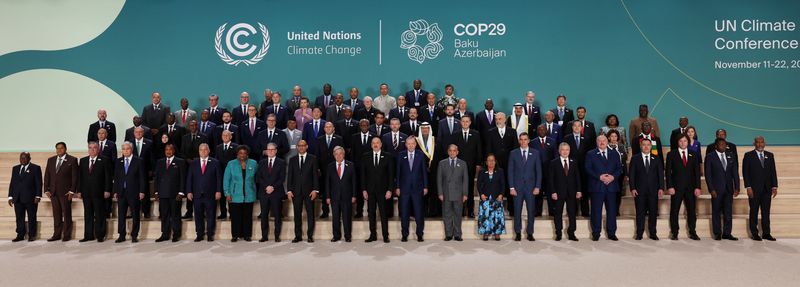
By William James and Kate Abnett
BAKU (Reuters) -The president of Azerbaijan, host of this year’s U.N. climate summit, lashed out at Western critics of his country’s oil and gas industry on Tuesday.
Speaking in his keynote address at the COP29 climate summit, where nearly 200 nations are negotiating global action on climate change, President Ilham Aliyev described his country as a victim of a “well-orchestrated campaign of slander and blackmail”.
Within moments, U.N. Secretary General took the stage to say that doubling down on fossil fuels was an absurd strategy.
The opposing views underscored the challenge at the heart of the climate negotiations: while nations are urged to shift to green energy sources, many including wealthy Western nations continue to rely on fossil fuels.
Azerbaijan says oil and gas are falling as a share of its economy as it diversifies into other sectors.
“As a president of COP29 of course, we will be a strong advocate for green transition, and we are doing it. But at the same time, we must be realistic,” said Aliyev, who has labelled his country’s oil and gas resources a “gift from god”.
“Countries should not be blamed for having them, and should not be blamed for bringing these resources to the market, because the market needs them. The people need them.”
He singled out the United States, the world’s largest historic carbon emitter, and the European Union for particular criticism.
“Unfortunately, double standards, a habit to lecture other countries, and political hypocrisy became kind of modus operandi for some politicians, state-controlled NGOs and fake news media in some Western countries,” he said.
The United States is the world’s largest oil and gas producer. European countries, meanwhile, have some of the world’s strictest targets to cut emissions by 2030 – but have also raced to secure new gas supplies following Russia’s 2022 full-scale invasion of Ukraine.
Observers of the COP29 negotiations were divided on how to take Aliyev’s surly speech. Some said it did not bode well for a strong result from the two-week summit.
“Using a climate conference to promote the continued production and use of fossil fuels is … provocative, and deeply disrespectful to the countries on the frontline of climate impacts,” said Romain Ioualalen, global policy lead at campaign group Oil Change International.
The tension also reflected mistrust between rich and developing nations, many of whom feel that wealthy countries have not done enough to solve a problem that they created.
“Developed countries have not only neglected their historical duty to reduce emissions, they are doubling down on fossil-fuel-driven growth,” said climate activist Harjeet Singh.
“Such hypocrisy is a dangerous dereliction that puts our collective future at risk,” he said.
U.S. national climate advisor Ali Zaidi brushed off President Aliyev’s remarks, saying if every country decarbonised at the pace of the United States, the world would meet its climate targets.
Aiming to slash methane emissions from the United States, President Joe Biden’s administration on Tuesday finalised a methane fee for big oil and gas producers. But the measure is likely to be scrapped by incoming president Donald Trump.
The EU declined to comment on Aliyev’s speech.
Back in Europe, however, a Dutch appeals court on Tuesday issued a landmark climate ruling that favoured Shell (LON:SHEL) in dismissing an earlier order for the oil and gas company to sharply reduce emissions.
PAY UP
This year’s summit is meant to focus on raising hundreds of billions of dollars to fund a global transition to cleaner energy sources and limit the climate damage caused by carbon emissions.
“The world must pay up, or humanity will pay the price,” Guterres said to the summit. “We are in the final countdown to limit global temperature rise to 1.5 degrees Celsius, and time is not on our side.”
But on the day of the event designed to bring together world leaders and generate political momentum for the marathon negotiations, many of the leading players weren’t around to hear Guterres’ plea.
Following Trump’s U.S. election victory, Biden has skipped COP29. Chinese President Xi Jinping sent a deputy, and European Commission President Ursula von der Leyen decided to skip the event as well.
Britain did send its newly elected prime minister, Keir Starmer, who announced an updated emissions cutting target of 81% by 2035. He said the more ambitious targets would be achieved through investments in renewable and nuclear energy, carbon capture technology and hydrogen fuel.
At a news conference on Tuesday, COP29 officials sought to refocus attention on the summit’s climate finance goal.
“Enabling every country to take strong climate action is 100% in all countries’ interests, even the largest and wealthiest,” said Simon Stiell, head of the UNFCCC climate body that facilitates the summit.
“The climate crisis is fast becoming an economy killer,” he said.
With this year on track to be the hottest on record, scientists warn that global warming and its impacts are unfolding faster than expected.
While the leaders were trading barbs in Azerbaijan’s capital of Baku, acrid smoke from climate-fuelled wildfires was forcing evacuations in California and triggering air quality warnings in New York.

In Spain, survivors are still coming to terms with the worst floods in the country’s modern history, with the Spanish government announcing billions of euros for reconstruction.
“As we look around the globe, we see funds flowing freely to wage war, but scrutinised when it’s for climate adaptation,” said Maldives President Mohamed Muizzu. “We must choose the path that changes lives, not the climate.”
This post is originally published on INVESTING.




